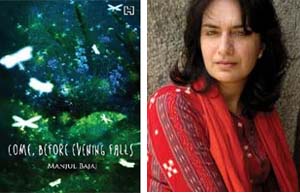Jan 31, 2026
Jan 31, 2026
by Julia Dutta
 Set in the Rotak Division of erstwhile Punjab Province in the year 1909, Come, Before Evening Falls is the story of two lovers, Jugni and Raakha who are poised by destiny to have inherited the same sense of loss right from their birth and who find themselves in the village named after the bull who died there – Kala Saand.
Set in the Rotak Division of erstwhile Punjab Province in the year 1909, Come, Before Evening Falls is the story of two lovers, Jugni and Raakha who are poised by destiny to have inherited the same sense of loss right from their birth and who find themselves in the village named after the bull who died there – Kala Saand.
The story takes the Reader through a journey of the lives of the above characters in the background of the social tapestry of a Jat family living in the village of this province.
Raakha hates his father from the marrow of his bones, for having used his mother for sexual gratification, when she in her youth had come to help her elder sister after she gave birth to her first born. Raakha bears in his heart the angst of his mother as the second wife in the same home where her elder sister is the first. The fury remains until much later when he at an opportune moment tries to make the best of it, by reliving it to his advantage.
But alas!
Trying to make something out of his life, Raakha, armed with a BA degree from Lahore, comes to Kala Saand as the school Master anxious to make the difference. Already he has become the talk of the Chaudhury Hukum Singh’s household, who own the School. It is only a matter of time, that he also becomes the heart beat of Jugni, Hukum Singh’s most eligible niece. Jugni is neither literate nor has she ever gone to school. Her duties lie in the house, looking after the needs of her brothers and the household chores with her grandmother. Jugni’s parents are both dead and Hukum Singh has taken the place of the absent father for her and her little brother.
Call it sparks of jealousy, or the newness of the experience of having someone from a different village come to stay in theirs, or just a need to belong to someone who has become so special to all her siblings, Jugni finds herself, despite all her attempts to fight it, attracted to Raakha. The love is not one sided as is revealed soon. In the cover of the fields and the temple steps, a pulsating, compelling love, has begun to rake the minds and bodies of the two in a way that will never find its place in society.
“ She could still feel his touch on her skin…….there were no thoughts in her head as she walked back home quietly – only an acute awareness of the stretch of skin that pulsed alive and separate from the rest of her body” – pg 77
“He woke with a start….the last image, before he broke out into a sweat, had been of Jugni’s bare breast, exposed to his beast’s gaze.” – pg 126
Love has a mind of its own, nestled in the heart of the lovers and no matter how many times and in whatever way, Jugni tries to stop herself from its torrential downpour, she fails. When, she tries to let her head rule her heart, Raakha is broken. They both know that this love will find no place in the hard and rigid society they live in. Yet, it is not possible to live without each other. Raakha pleads, pursuing her to give him a chance to find ways to have her forever. She agrees. But it never occurs to her that his extraordinary scheme would be hatched out of trying to making a winning score out of his own damned past. Too bad, Raakha could never have got the better of it. In that sense, history never repeats itself - for the better.
Only for the worse!
Written in simple English, the Reader will never have to open the dictionary even once. Moreover, even though there is a certain leisurely way the book begins, it picks up speed and at the end the last few chapters are full of suspense as the Reader joins Raakha trying to hatch his plan to keep Jugni to himself for the rest of his life and not lose her to marriage with someone else.
Also, the author is merciless in the use of Hindi words without any footnote – bauji, hat-ke, charpoy, misri, nakhras, nautanki and what have you. She leaves it to her Readers to go deal with it.
The book is a comfortable size and fits into a lady’s hand bag or the winter pocket of a coat. Just so that you can turn to it at any time and enjoy the rural panorama and lifestyle, which can be such a retreat for the harried, hurried minds of the city born, bred and city fed.
17-Jan-2010
More by : Julia Dutta